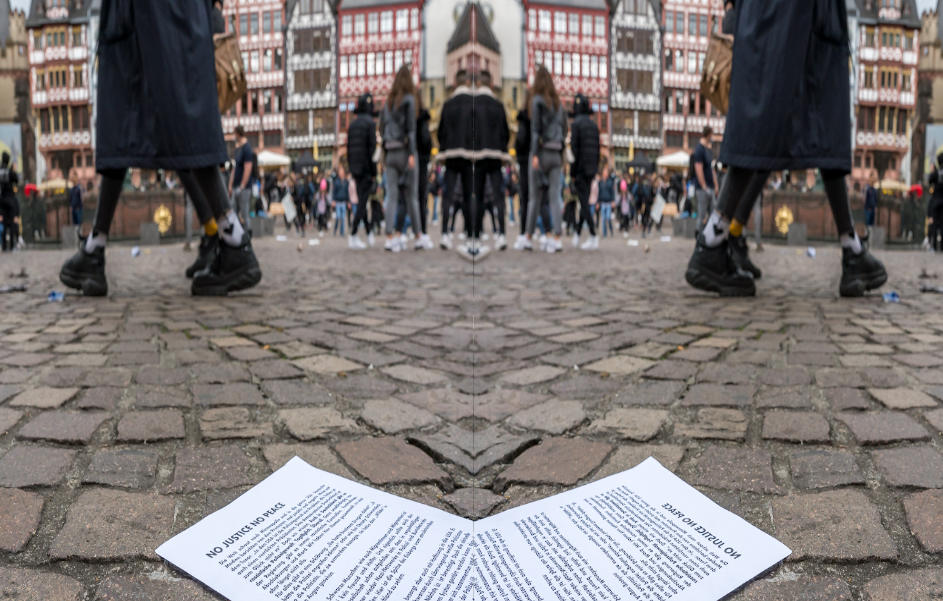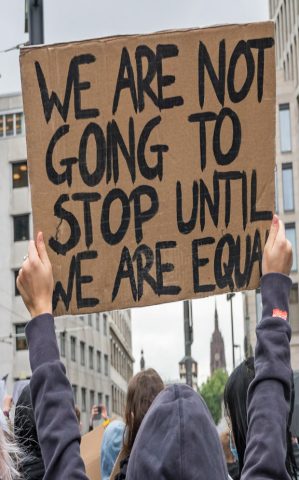We wake up early to face our daily problems. A job that does not pay enough, a family that needs and asks for your attention, a house that only lasts a few hours clean, the bills to pay, a car that insists on throwing a tantrum, and forcing us to take it to the workshop.
Not to forget the friends who want to meet with you for a drink. Where did I leave the phone this time? You have to go shopping, take the children to school, make dinner, water the plants and all that in just 16 hours!
There is much to worry about, the degree of difficulty increases or decreases with our social situation, and the watch does not offer any kind of mercy.
It is the few moments sitting on the sofa, with a book, a magazine, the news, or a blog, where we find out that we are not the only ones in such a complex bubble of problems, made up of many layers that increase in size, diversity, and confusion.

Today, our private space dedicated to tranquility and reflection, where we leave our bubble and mentally travel to the outer and apparently distant world, is a privilege that few have or give due value.
It can be said that the internet and the media facilitated access to events and crucial information that affect life and social order throughout the world. News that previously barely reached the most fortunate, now allows us all to formulate our opinion on topics of world interest in just 15 minutes of commute to work.
We are, unlike the past which was characterized by deprivation of information, overwhelmed by titanic waves of numbers, names, images, sounds, and places. Never before have our precious senses worked so hard to filter (or simply accept) such a monstrous amount of data, of which a very low percentage has any meaning or significance to us.

Is it then reasonable, that those who dedicate themselves to investigate, to read more deeply, those who find time for reflection to form a more concrete argument, clean of external influences, lies, publicity, and all of the superfluous media “garbage” with which we are frequently overwhelmed, is it reasonable for them to judge the majority of the population, who lost in the tangles of life do not invest a “tick” of their watch to check if “what they say on TV/internet” is true?
In one of those moments dedicated to me, I realized long ago that this criticism does not bring progress or positive development towards the problem. It seems unfair to place one more burden on the back of someone who is already dragging a stone of considerable weight up the mountain. We often hear about studies that try to show the brain’s infinite capacity, yet our time, patience, and especially our concentration are easily exhausted.
It seems that, facilitating the lives of others by developing valuable, compact content, without ulterior motives, that stimulates the autonomous judgment of those who read, listen and/or watch is a much nobler task.
The truth
When photography came into the hands of the world, it became a passion. It made the art universe its home by allowing the artist’s expression with visual abstractions, but it had another great advantage in its favor, one that is losing strength every passing day. Much more than a painting, the photo has a strict connection with reality, with the truth. Any object, person, or event receives a certificate of existence by appearing in a photo. We even use it as proof in trials. By bringing the truth with it, the photo earned our vote of confidence.

Without speaking the truth, either by prohibition or by decision, we cannot establish a point of trust, the basis of honest cooperation, food for the social union that brought so much progress to our civilization. Without the truth, how could we relate with our partners? with our friends? with our government? with the world? How could we remove the flames of suspicion that corrupt our minds and poison our hearts?
It is by believing in the truth that I interact with others, that I can travel on a plane or have dinner in a restaurant without fear, that I read the news, that I am going to vote, and that I believe in the resolutions and opinions that I hear inside my head!
The truth alone does not make the planet spin, but without it, chaos would reign, security and prosperity could not breathe, a poisoned space between yes and no.
Many would agree with me that this is a seemingly simple fact and easy to accept. So why do we keep lying?
I once read in some book, that the key moment in our history was the birth of our conscience, that solemn moment in which Man looked at his image reflected in the water and recognized himself. In the water, he discovered his physical appearance but also his mental appearance. He learned to detail his strengths but also his weaknesses. What he likes and what hurts him. There he saw that others were equal to him and therefore, that they suffered from the same. He discovered how to harm his fellow man.
As a child, listening to the story of Adam and Eve, I always asked myself, why did God expel them from Eden? Why did he not want them to gain the power of wisdom? to distinguish good from evil? Now in my adulthood, I found a satisfactory answer. We cannot recognize good without recognizing evil. One cannot be without the other.
The lie
We have all told minor lies to escape a problem, we know that the bigger the lie, the worse the mess. There’s an old Portuguese proverb that says: “A liar is caught faster than a limp person”.
A lie is an ancient tool and that’s why it’s highly developed in our conscious system. A good lie is like a spider web, it opens in several directions. Depending on the number of prey to be captured, it needs a larger or smaller size, more or fewer active nodules to disperse through, and more or less energy being spent by the predator.
There is a limit on the number of victims that the predator, hunting alone, can catch in his web of lies until the entire scheme turns against him. A good liar knows that to catch more victims he must convince lesser predators to enter his hunt and thus be able to lengthen his trap.
The lie is often used for direct benefit, by one pretending to deserve the reward (objective or subjective), but also indirect, by wrongly targeting others as provocateurs of evil, or as conjurers of the lie.
How do you feel when you know that someone has lied to you? When you are the last to discover a big lie that everyone has already discovered? It commonly ends with: “… but it was obvious!”, or the famous “… it was written on his/her face!”. In those moments, the feeling of discomfort we experience is so fast and strong that we respond instantly and often without thinking.
Why we lie
The purpose of personal lies can be varied, sadly there are very few reasons to tell the truth and 1001 reasons to lie, but there is one reason that has recently seen a growth in its use and effectiveness.
“The supreme art of war is to subdue the enemy without fighting.”
– Sun Tzu, The Art of War
A lie is a difficult thing to forgive and it can leave a gap impossible to close between people. When applied on a large scale and with sufficient support it can cause a tear of division in society, adding to other causes of social unrest and if some dire conditions are met, it can even be the spark that starts a revolt or war.
Division in society, along with other factors such as racism, inequality, or economic crisis, is a powerful vehicle for lies, slander, and denigration.
Our freedom, our rights, and our respect as individuals are the most precious benefits we derive from democracy. As a civilization, we have fought a lot for them and we continue to do so, for our rights and when possible for the rights of those who cannot defend them. We don’t need to search exhaustively to find out who suffers the most in the midst of great social upheaval. It is democracy and our rights as citizens.

Without our dedication to the truth as the engine of our social system, we discard a key link in the chain of stability and security. When we lose our trust in the institutions that represent the truth, the facts lose their value and we fall into a well of fictions, theories nourished by emotional stimuli. We create fires of rage and violence, feeling attacked by the differences in ourselves. The social personality of the Human Being acts against society itself, grouping people who present the same cloudy and reducing vision, a lake of confused minds but surprisingly strong convictions, who fight for a “truth” that they can only justify emotionally and not through facts.
Our past is full of alerts, signs, narrow paths that we believed to be the correct ones. Motivated by people with strong and cunning voices, people who know the value of truth and lies and the knowledge needed to exploit the lack of one of the excesses of the other. A country living in uncertainty would be a negative situation for everyone, except for its enemies, those who take advantage of its people, its resources, and its internal conflict.
Different fictions categories
The world’s nations have quite complex development paths. Benevolent or malicious monarchies have ruled their empires in an imposing way, but even the king will rule an unstable kingdom, and risks revolts if his subjects do not trust his word.
Analyzing the past and present of authoritarian, dictatorial, or even tyrant governments, it is easily observed that the use of force, repression, and lies are what keeps them above water. The Second World War shows us clearly the effects these methods have on different societies, but we must remember that our past comes from the present.
Imposed dictatorship
According to a 2019 report from the International Institute for Democracy and Electoral Assistance, IDEA, an organization made up of 14 countries around the world and that measures the level of pluralism of government institutions in the world, 28% of the world’s population live under a dictatorship and another 15% in a kind of hybrid regime.
Today’s dictatorships maintain their status through repression of information and freedom movement, the use of force, state propaganda, fake news, and the defamation of their enemies. It is said that a lie can be repeated so long until it becomes true and that fact is one of the bases of authoritarian propaganda. Populist expressions like: “What they say is a lie!”, “Look how bad they are and their own citizens hate living there!”, “We are innocent and they want to attack us!”, are used to turn the story in their favor.

Nobody likes to feel guilty or feel their human dignity, their values , and their beliefs under constant attack. The normal and automatic reaction is defense. Furthermore, sanctions applied by neighboring countries with a sharper ethical sense can be deemed as an “external attack”.
Some governments of Eastern Europe do not hesitate to use homosexual rights, which carry with them freedom of expression, as if they were an external attack on the family and religious values of their population, values that they frequently use as the image of their campaign. In 2012, for example, Belarus suffered European sanctions for anti-gay comments made by its president, Aleksander Lukashenko.
“Better to be a dictator than to be gay”
– Aleksander Lukashenko, President of Belarus
The population, receiving corrupted information or being deprived of it in its entirety, submerged in a terrifying fog produced by violent repercussions, a constant wave of propaganda, and suppressed freedom, have few positions available to take against their rulers:
Believe in them with pride, becoming fervent followers of the regime, letting themselves be carried away by the avalanche of emotional explosion that accompanies the faith in their leader and hatred of their enemy.
Resist as opposition to oppression, risking several years imprisoned suffering torture, never again seeing your country again or even death. Always with the probability that your voice will never be heard by those who need it most.
Recognize your situation, crying silently, on constant alert, and walking on tiptoe to go unnoticed.
None of the paths seem easy to take and isolation is a common point between all of them.
There are several examples of non-democratic governments for which the term Dictatorship is openly used as a classification. According to the IDEA, dictatorships in countries such as North Korea, Swaziland, or Saudi Arabia have ancient origins. Some start their story from the beginning of the 18th century, while others have recent origins, such as Venezuela, which was, as of 2017, classified as a dictatorship by the institution.
Eroded democracy
According to the same IDEA report, 57% of the world’s population lives in a democracy, which shows a growth in relation to 1975, where only 36% of the regimes were democratic. Democracy represents a development of conscience and social voice, in favor of human rights, freedom of expression, voting, and equality before the law. It is not only a vote of confidence in the government but also in the population who must express their voice by voting for representatives and policies with which they identify.
If we don’t believe the facts, accept the most fervent arguments, or settle for controversial decisions without questioning, our right to liberty, something we now take for granted, can deteriorate very quickly.
Yes, there was an increase in the number of democratic countries, however, this same IDEA report concludes that the last decades have seen a greater erosion of democratic values, mainly in regions such as North America and Europe, precisely where democracy is older and stronger. There are more and more signs of recurrent repressions of political alternatives, freedom of communication, religion, movement, and more decline in the integrity of the media, all of which are key points in the civil space.
These democracies, by many considered exemplary, are now under severe pressure due to limited progress in the fight against corruption, social inequality, prejudice, judicial independence, and demographic issues. Factors that not only increase social tension but also demonstrate weaknesses that can be exploited by enemies.
“Authoritarianism comes not because people say they want it, but because they lose the ability to distinguish between facts and wishes.”
– Timothy Snyder, The Road to Unfreedom: Russia, Europe, America
Social topics such as immigration, physical and virtual terrorism, espionage, nuclear weapons, influence the electoral process. Lobbies and dishonest business, climate change, patriotism and/or nationalism, conspiracies, nefarious presidents, or tyrants with suspicious friendships are points of instability that can easily trigger our defense instincts and lead us to violence, disabling our ability to reason and make the right choice for everyone.
These problems must be discussed openly and rationally among all or they will become open doors to an unprecedented political and social cataclysm. Looking at the current world situation, I believe that we have postponed these dialogues for too long and will need an immediate response in the very near future. Passivity will not save us. Either we think about this in the present or we will fight for this in the future.


